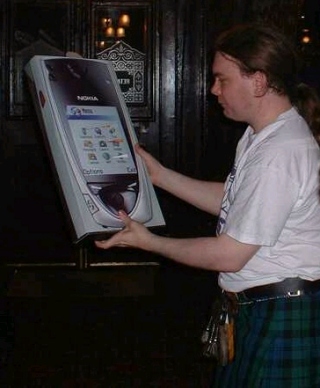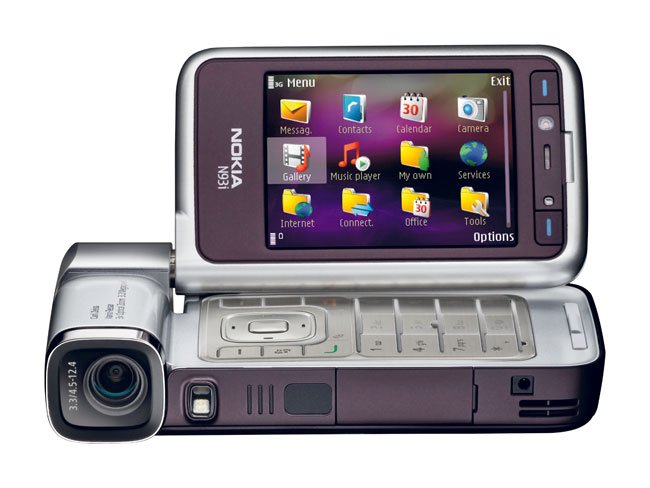 While it wasn’t quite the “one more thing” that the Apple fans were expecting, this week’s announcement of the ‘Apple iPhone’ finally puts to rest a huge amount of speculation... Now we know the replacement to Apple’s Newton PDA is finally on the way, we can sit back and analyse the impact this will have on the market, what it means for the PDA and Smartphone manufacturers, and just how much chilling effect the early announcement will have. Well, Steve has been looking at that. I want to pick up on the idea of this device being ‘revolutionary’ and ‘five years ahead’ of the competition, two of the key points raised by Apple CEO Steve Jobs.
While it wasn’t quite the “one more thing” that the Apple fans were expecting, this week’s announcement of the ‘Apple iPhone’ finally puts to rest a huge amount of speculation... Now we know the replacement to Apple’s Newton PDA is finally on the way, we can sit back and analyse the impact this will have on the market, what it means for the PDA and Smartphone manufacturers, and just how much chilling effect the early announcement will have. Well, Steve has been looking at that. I want to pick up on the idea of this device being ‘revolutionary’ and ‘five years ahead’ of the competition, two of the key points raised by Apple CEO Steve Jobs.
So what happens if we find the clock back 5 years? After all, we need to see what massive jumps in technology have been made in the last five years to see what a phone ‘five years into the future’ should be building upon. So what do we have to look at? Quarter 2 of 2002 (so about June then) saw the release of the first Series 60 phone, the Nokia 7650. The price? Around £400 ($699) unlocked. If you bought it on a contract then you could pick up the device for around £100-£150 with a one year contract.
The device itself hid most of the complex buttons underneath a sliding mechanism – a closed phone was nothing more than a single cursor, two soft keys, a home key and a (for then) huge phone screen of 176x208 pixels. Up in the far left corner, there was a proximity sensor so the device knew when you were holding it to your ear (and incidentally, one of the most popular forum requests on All About Symbian was how to turn that blasted thing off).
Under the hood you had the latest Operating System, specifically geared towards the needs of a mobile device. David Wood (the current EVP of Symbian) has written that the smartphone Operating System has to fulfil the following requirements:- To make it easy for applications to take advantage of the power of the hardware and network
- To avoid different applications clashing with one another
- To be aware of environmental errors, such as low battery, low memory, loss of communications and low disk space.
(Symbian for Software Leaders, pp 9-10, 215)
Over time, we saw that the 7650 and Symbian OS was supremely geared towards this, having been designed from the ground up to work in a mobile environment. Taking a deskbound OS (such as Windows or OS X) is a much harder route.
The 7650 had other advantages. It came with messaging client which fully integrated the Contacts application with SMS, POP3 and IMAP support. Third party software allowed you to read Word documents attached to an email from a desktop computer. It had the ability to load the award winning Opera web browser to fully navigate the rich and diverse web.
Now things have moved on since then (cf Moore’s Law), storage for one. The 7650’s Achilles heel was the small amount of storage space (4MB), which was rapidly sorted in the second Series 60 phone (the 3650/3660) by the addition of MMC support for cards up to 1Gb in size, turning it into a rudimentary media player as well.
And now, 2007, five years down the line? We now have current smartphones sporting 8GB of internal memory and external cards of comparable size. We have phones using GPS, rather than relying on GSM tower signals. We have devices capable of DVD resolution video recording at 30 fps that can output the signal out to any television through standard connectors. We can roam at near broadband speeds on 3G UTMS networks, pulling video podcasts out of the air, we can have our personal photos taken and uploaded in seconds, and then viewed from anywhere in the world a few seconds later. Anyone with knowledge of C++, Java, Python or Flash can write code for these devices and anyone can run them on their own devices.
So while I’m more than happy to award Steve Jobs points for being a really good showman and getting everyone talking about his new Newton, they’re all going to be taken away again because the functions that he’s proudly boasting are 'five years ahead of everyone else' were, in fact, mainly with us five years ago.
Not that anyone is going to believe us.
Ewan Spence, 11 Jan 2007

